Share
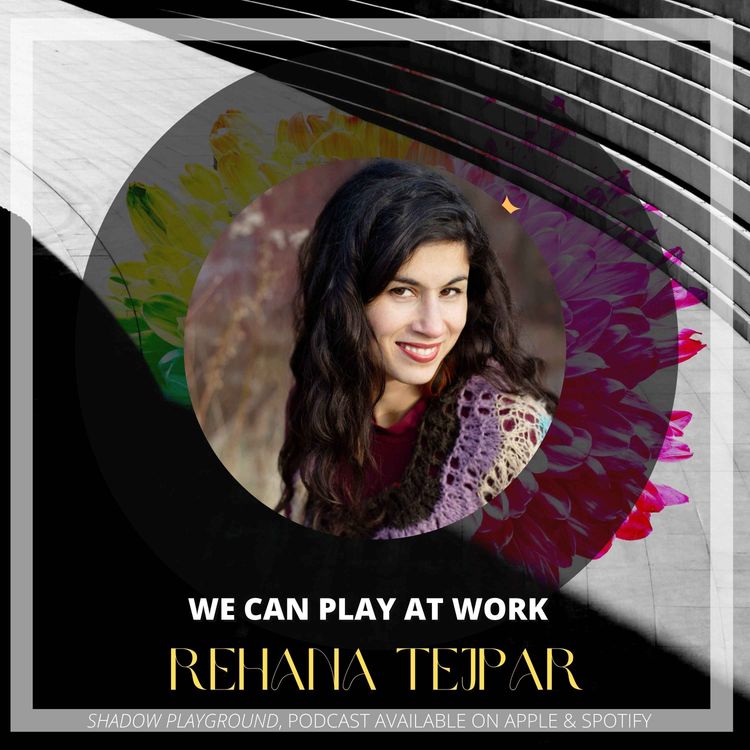
Shadow Playground
We can play at work with Rehana Tejpar
Facilitation in organizations is a field full of opportunities for play as well as obstacles to connection. To navigate an organizational field, a deep curiosity and nuanced approach are needed. In this episode Rehana Tejpar, founder of Bloom Consulting, lifts the curtain on the practices and philosophies underlying her work helping organizations become more human and free.
-GUEST BIOGRAPHY-
Rehana Tejpar is a facilitator, mediator and coach working with leaders and organizational ecosystems to support culture change towards equity, collaboration, organizational health and creativity. Since 2005, she has been playing with play-based learning and transformation through Theatre of the Oppressed, InterPlay, and more recently sacred clowning. She is deeply serious and deeply playful at once, believing in the need for strategies that include creativity & play as ways to open up the fields of possible transformations, and reconnecting our mind, body, heart and spirit. She is based in Tio:tia’ke/Montreal, on the shores of the Iroquois River and works with Bloom Consulting.
-EPISODE SUMMARY-
PRACTICES:
- Host a retreat to create a theory of change.
- Build an internal team to steward and champion a change initiative.
- Be a wise fool and practice not knowing.
- Share stories to naturally overcome any illusionary divide.
- Create a circle where everyone has an opportunity to speak from the heart and hear from one another is a safe structure. It is not a space for interruption or rebuttal. Often there is a question at the center.
- In a moment of feeling stuck, ask, ‘What is the next most graceful step?’
IDEAS:
- We can't lead people somewhere where we haven't gone.
- Nothing is supposed to be perfect - this is a legacy of white supremacist culture.
- Your way of being can also help an organization grow.
- It’s possible to have a shared purpose and to play at work.
- People trust solutions they are part of building.
- We can create participation for different parts of ourselves.
- A small group is a fractal of change and a place to practice our wisdom about change.
- Sacred clowning helps people not fall into dogma or a singular truth that would confine the unknown mysteries of the world. These clowns also spoke truth to power.
- The clown lets go of perfectionism, accepts offers, is deeply alive and in awe of the miracle of life.
- Connecting with one’s inner clown can be liberating because we are letting out our unknown desires.
- Playing games with groups helps the magic of life pour out of ourselves.
- There is a strong bridge between mindfulness and playfulness. Play stills our mind, pushes away distractions, and brings us to the present.
- When we see each other in our vulnerability and our imperfection there is an outpouring of love. There are obstacles and barriers to giving and receiving that love.
- Playing and risk taking can help shed some of the barriers to connection.
- We can work in partnership towards a dream of us being human and free.
More episodes
View all episodes
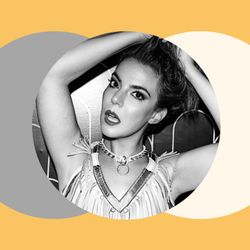
5. BDSM, Kink and Somatic Healing with Priestess Francesca
57:30||Season 2, Ep. 5-GUEST BIOGRAPHY-Priestess Francesca is an internationally renowned relationship coach, sexy educator, dominatrix, and sassy writer on all things hard (cocks and emotions). She’s walked the path most are too scared to even peek at and is here to turn your repressed fantasies into powerful tools for healing, growth, and straight-up self-acceptance.Her insights have been featured in Cosmopolitan, Business Insider, Health Magazine, and on top 1% podcasts worldwide. In addition, Francesca’s groundbreaking ideas have been shared at universities like Salve Regina and Sarah Lawrence, and at prominent festivals such as Envision, Dom Con, and Toronto Tantra Festival. Her mission is simple: Help you own your desires, embrace your full self, and see sex as a powerful tool for transformation. Because pleasure isn’t just play: it’s your power move.LINKS: Trauma, Kink & Somatic Healing: Watch Now For FreeThreshold Ritual: Download the Free GuideFreak School 1:1 Intensive: Claim Your PermissionPRACTICES:Ask yourself: why do you heal?Make it safe to not be safe.Do a height check before engaging in these practices. Do you know what a yes or a no feels like in your body? When you do, how liberated is your throat around your truth? Can you speak it? How do you respond when someone has a tornado in the face of your truth? How anchored can you remain?Let your fantasy inform your reality by allowing your imagination to be present in it.Fill out feedback sheets after scenes.Negotiate aftercare and integration before a scene.IDEAS: Pearls of beauty are often found in the depths of darkness. There is grace and beauty in places that feel scary.If we wholeheartedly believe something doesn’t exist, we won’t look for it.Night vision is needed when looking into dark depths; you have to see beneath the surface.When you meet in a place of darkness where society’s rules can’t hold, you drop deeper and the heart can crack open.Healing is becoming more okay with who you naturally are.Everyone carries desires related to BDSM; we often don’t give ourselves permission to find something hot.A strong goal orientation can become oppressive.You don’t need to figure out exactly what you’re healing—don’t turn healing into recess homework.You have to trust that your desire will reveal its fruit to you.We live in a society full of ideas about what sex should look like.Therapy often tries to move you away from recreating traumatic experiences, away from what hurt you. But what if part of healing is going into it differently?We will hurt each other without meaning to; restorative repair is essential.There are often gendered stereotypes within “conscious sexuality” communities.This is healing work. If we can deepen intimacy when we’re naked, we can deepen intimacy when we’re clothed.
4. From Perfectionism to Self-expression with Kara Latta
55:38||Season 2, Ep. 4-GUEST BIOGRAPHY-Kara Latta is a Play & Mindset Coach and the founder of The Playful Warrior, a platform focused on helping high-achieving individuals overcome perfectionism and reconnect with their authentic selves through play. Using techniques like NLP, hypnotherapy, and EFT, Kara’s coaching programs encourage creativity, joy, and personal growth.LINKS: www.theplayfulwarrior.com PRACTICES: Soothe your body with gentle touch or self-talk to shift out of fear and return to a calm, logical state.Reassure your mind by gathering real-world examples that show taking risks, like being visible online, is survivable.Treat action as a playful experiment where trying, failing, and learning are all part of the process.Understand that being seen online is an important step toward growing your business.Mute people who discourage your self-expression and show up for the version of you that once needed permission to be free.Each month, choose one or two activities that generate income and genuinely light you up to stay aligned and energized.Start each day by tackling one important task that moves your work forward.IDEAS: Perfectionism is not about thinking you're perfect, but about never feeling good enough and using that to avoid judgment.As children, we often learn to value getting things right over expressing ourselves, which leads us to adapt in order to belong.Play helps us reconnect with our true selves and heal perfectionism by making the process more important than the outcome.Doing things that are aligned doesn't always feel easy, and challenge can still mean you're on the right path.When someone judges you, it usually reflects their own limitations or fears, not your value, and you can choose to respond with compassion.If you're being fully authentic, some rejection is inevitable, and if you're not being rejected at all, you may be hiding parts of yourself.Achievement that comes from play builds trust and self-love, while perfectionist achievement is driven by fear.Letting go of where you think you should be allows you to honour your own timeline and path.Perfectionism can also show up in healing, so it's important to offer yourself compassion instead of expecting to do personal growth perfectly.
3. Drugs, Healing, and the Return to Wholeness with Ashley Booth
55:18||Season 2, Ep. 3-GUEST BIOGRAPHY-Ashley T. Booth is a psychotherapist and pioneering figure in psychedelic-assisted therapy, specializing in modalities such as Internal Family Systems (IFS), somatic psychotherapy, and ketamine-assisted therapy. She is the founder of the Southern California Psychedelic Society and co-founder of InnerSpace Integration. With over 750 ketamine-assisted psychotherapy sessions under her belt, Ashley is a leading advocate for integrating psychedelics into therapeutic practices and is recognized as a top thought leader in the field. She is also the author of Quieting the Storm Within, an introduction to IFS therapy, and actively contributes to psychedelic education and harm reduction efforts.LINKS: ashleybooth.net IFSandbeyond.comPRACTICES: Get comfortable not knowing the answer. Let mysteries stay mysteries longer than feels comfortable.Use systems to make sense of the work.Explore different frequencies so you can tune in with others.Model joy to give others permission to do the same.Do this work in community and with wisdom keepers who have gone before.Let people go through phases of grasping and longing.Use challenges as learning opportunities and ways to grow.IDEAS: The drug war shaped harmful ideas about medicine and drugs. We can break free from those paradigms.Drugs can be used to escape, and sometimes that is necessary.Instead of saying "recreational use," say "celebratory use" to emphasize life and connection.Try to be in right relationship with these substances.Drugs often lead to deep experiences of love.We are souls beyond what can be named with words.Recognize and honor Indigenous cultures that use plant medicines and carry important knowledge.Drugs are not cures. They help us face limiting beliefs and allow us to feel more deeply, both pain and joy.These medicines often make you feel worse before you feel better. You have to break things down before rebuilding.These medicines are spreading during a critical time in human evolution. Help is coming from many places: plants, animals, fungi, even labs.Things once considered shameful deserve to be accepted as they are. Shame can also be a way we try to feel safe and belong.Internal Family Systems (IFS) views us as made up of many inner parts, each with its own voice, needs, and memories. These parts often form to protect us and reflect our deeper human needs. When these protective parts are gently acknowledged and allowed to step back, we can access a deeper essence within us known as the Self. Through this process, IFS helps us understand what blocks our vitality and guides us back to our true nature.
2. Deep Democracy and the Practice of Welcoming It All with Emily Yee Clare
53:24||Season 2, Ep. 2-GUEST BIOGRAPHY-Emily is a mixed-race settler (Chinese/white) based out of Montreal, the traditional and unceded territories of the Kanien’kehá:ka, They are passionate about their work as a consultant and facilitator and have close to 10 years of experience in anti-oppressive change management, human resources, conflict mediation & curriculum design.PRACTICES: Tap into image, sensation, or metaphor to get a more somatic, accurate read on what’s happening in the group.Normalize playful banter—it softens the space and invites levity.Physically explore inner tensions or polarities (e.g. “I want chicken / I want tofu”) by stepping into each perspective. Then return to center to hold both truths and reflect on what’s needed to integrate them.When interpersonal tension arises, pause and ask: What’s creating this dynamic? Often, it’s unspoken needs or unclear boundaries.Let small facilitator “flaws” (e.g. messy handwriting, imperfect flipcharts) model that it’s okay not to be on top of everything.Use art, metaphor, storytelling, roleplay, or fidget tools to engage imagination and ease.Track and share your inner state (e.g. “I feel a little tense”), and name group dynamics (e.g. people fidgeting or looking away). It builds shared awareness.Notice how resistance shows up in yourself or the group. There’s wisdom in it—it can be a diagnostic tool.IDEAS: Honouring every voice—rational or emotional—helps surface the real conversations a group needs to have.When a group repeats a dynamic, they’re “cycling.” Awareness of this helps break the loop.Group shifts can happen at the individual, one-on-one, or group level—each one impacts the others.We all hold multiple roles (e.g. joker, carer). Creating comfort in shifting between them fosters relational wisdom and shared responsibility.If there’s tension or a marginalized voice, lean in—there’s often opportunity and insight there.Don’t exile your needs—learning to notice and name them helps deepen group connection.We’re allowed to show up grumpy, tired, or joyful. Creating space for the full range of being human is essential.Joy, happiness, and lightness also need a safe space to be expressed—not just struggle.Every group carries a pressure to perform—even without suits and ties. Loosening this helps people show up more authentically.Conflict is often more tolerable than the fear of it. It doesn’t have to be intense—it can be held with curiosity and care.To create safety in a group, we must first feel safe within ourselves.
1. Freedom to be Angry with Jessica Wallace
49:48||Season 2, Ep. 1Jessica Wallace is a Marriage and Family Therapist based in San Francisco, California. PRACTICES: Simply say no. For instance, you could say, “No, not today,” or “That won’t work for me,” or “I didn’t like that.” Find a way to let anger move somatically through your body. For example, shake, jump, run, pound a pillow, sigh, or push energy through your feet.You don’t always need to process your anger relationally; you can work with it on your own.Train your anger response in advance by preparing specific sentences. Identify which phrases you’re missing and create them for easy use.When you notice anger in someone else, you can mirror it back to them. Then, observe if any defenses arise and work with the person to address them.Reflect on how anger was or wasn’t expressed in your family. As a primary emotion, it likely played a significant role in your childhood.If you write an angry message, leave it for a while, then revisit it later.When you are angry, tell the other person, “I’m not going to hurt you.” Be explicit about creating a sense of safety.Integrate play into situations of anger in creative ways. For example, you could say, “You’re making that angry face! Go take a look in the mirror.” We can approach our emotions lightly, bringing humour to the experience.When faced with anger, respond with love. This can feel very supportive. You might say, “I love you, I am here.”If you need to take space, tell the other person, “I need to take space. And I love you, and I’ll be back.”Start by building awareness of how anger energy shifts in your body. You might begin by recalling a moment when you were angry and noticing what is happening in your body.Use journaling to explore and notice all the nuanced feelings that accompany your anger.IDEAS: Here’s the corrected version of your text:Anger is one of the core emotions. It is healthy and normal.To become more true, authentic, free, and integrated, we need to be in touch with our anger.Anger arises naturally as a response to protect ourselves when a boundary—internal or external—is crossed.Setting a limit doesn’t have to involve rage.A world without anger would feel deflated and collapsed.A distorted form of anger can manifest as violence or self-violence.Often, sadness or grief is hidden beneath anger.Culturally, there is significant judgment around anger and angry people. Many feel guilty, bad, or wrong when they experience anger.When anger is not expressed, it can build up and eventually explode.Friendships can deepen when anger is allowed to be expressed.Anger is a legitimate emotion. Just as we don’t typically question positive emotions by asking, “Why are you feeling that way?” there’s no need to ask “why” when someone feels angry.Our early relationships shape how we relate to the world, creating object relationships where people or things represent those early connections. This can result in misdirected anger.By addressing the internal relationship and the associated grief, we can liberate ourselves—focusing on the root cause of the pain.Our memories are always accessible, as they reside within our bodies.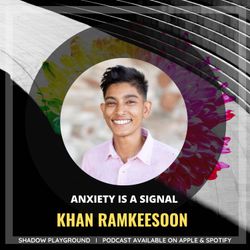
20. Anxiety is a Signal with Khan Ramkeesoon
50:48||Season 1, Ep. 20-GUEST BIOGRAPHY-Khan Ramkeesoon, a former licensed mental health therapist, now works as a group facilitator and coach specializing in embodied transformation and playfulness. An immigrant from Trinidad & Tobago of South Asian descent, Khan brings a rich cultural heritage and personal experience to their practice. As a queer and non-binary individual, Khan helps clients connect with their inner wisdom and experience greater love and joy amidst complex emotions.PRACTICES: When experiencing anxiety, get curious and tune into the sensations in the body. Explore what memories, concerns, desires and needs are there. Then, inquire into what else is present and what more you need to know. Finally, offer support and presence to the part of you that is feeling the anxiety. Ask how yourself how you are feeling about the anxiety.Adjust your breath to calm down. For instance, you can add an extended exhale. To improve your capacity to navigate anxiety, you can think of something challenging. Then relax your body and extend your exhale. Do a death practice where you lie down and imagine your death. Alternatively, do a year-long practice where you imagine you are going to die. IDEAS: Anxiety is an alert that something is going on. It is not bad. From that initial alert, we can attach additional layers of interpretation. It makes sense that we feel anxiety in social situations because our connections are meaningful for our survival. Instead of considering whether your level of anxiety is normal, consider whether it is affecting the way that you would like to be functioning in the world. Someone who has lots of anxiety is just picking up on a lot of things. There doesn’t need to be judgement about it; this ability can also be considered a gift. You don’t need to intellectualize or rationalize with the part of you that is anxious.Running away will also not help. As compared to stress, anxiety often has an element of feeling danger. Imagine a world where people are excited about death in the context of union & connection. By being in stillness and in coherence you can help anxious people who are around you.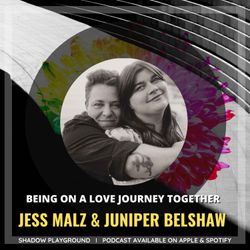
19. Being on a Love Journey with Jess Malz and Juniper Belshaw
56:21||Season 1, Ep. 19-GUEST BIOGRAPHIES-Jess Malz, Founder and CEO of Inbo, is driven by a passion for reshaping the future of work through dynamic, participatory, and collaborative processes. With over fifteen years of experience in learning experience design, facilitation, and leadership coaching, they’re dedicated to pushing boundaries and fostering growth. Their true joy lies in empowering leaders to embrace creativity, agility, and whole-heartedness. Juniper Belshaw, executive coach, facilitator, and managing partner at Inbo, has 15+ years experience guiding senior leaders and their teams towards increased performance, strengthened leadership, and better work relationships in organisations like Cirque du Soleil, Mila-Quebec AI Institute, David Suzuki Foundation, and federal and provincial governments. She’s passionate about building cultures of belonging where all people, including those from equity-deserving groups, can bring their full gifts to the table without barriers.-EPISODE SUMMARY-PRACTICES: Practice the erotic mundane: laughing, taking care of animals, cooking, dancing, lighting candles, hiking, cleaning, folding laundry, puttering. Give your partner reassurance that you aren't going anywhere.Create a couple’s voice. Do group therapy together - it can be fun! Make it a priority for both people to be their authentic selves. Commit to whatever is arising in the moment. Actually drop in and go through it together, e.g. ‘this is what is happening for me’, ‘this is what I'm scared of’. When a conflict pattern emerges (ex. A figure eight), disarm it by: taking off your clothes, lying on the floor, taking a breath and pausing, having empathy, exaggerate what the other person is saying. Know when a conflict won’t lead to more insight in the moment. Facilitate your own retreat for you and your partner. Take a weekend away in a hotel with your partner. Make intentional time to connect together. Debrief every week together. IDEAS: A relationship can be seen as a commitment to growth and learning and evolution. People get cranky before relationship and after they are in relationships. The couple can be a healing ground. It’s best to look at the baggage each person brings. Then you can notice the impact it is having today. Sometimes relationships just work out. There is infinite insight and depth in each person. Remove the expectation there will be a moment when there aren’t conflicts or fights in the relationship. Vitality can come from fully exploring and living what is right in front of you.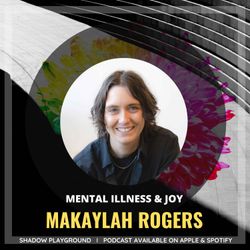
18. Mental Illness & Joy with Makaylah Rogers
55:18||Season 1, Ep. 18-GUEST BIOGRAPHY-Makaylah is a passionate mental health advocate and speaker who creates spaces that bring down walls, deepen connection and foster empathy. Makaylah is a neurodivergent, queer, non-binary, trauma survivor with a raw, yet relatable approach. They share stories that humanize hard truths, make us laugh and bring us together. Their advocacy work spans vital topics such as anxiety & depression, mental illness, neurodiversity, LGBTQ+ education, suicide prevention, sexual violence and more. By breaking stigma and fostering open conversations, Makaylah envisions a world where everyone feels a sense of belonging and safety. As a social impact entrepreneur, Makaylah co-owns two businesses with their wife, Fia- Lynn Crandall (she/her). Through their first, Scale Naturally, they work with socially conscious organisations to maximize impact by nurturing the unique potential of leaders and teams. Through their innovative approach to Inclusive Leadership and Diversity initiatives, they help cultivate a Culture of Care where everyone can contribute authentically, leading to enhanced productivity and wellbeing. Additionally, their business Frankie D's Donuts is on a mission to reduce loneliness… one Donut at a time. Their made-from-scratch Donuts serve as a conduit for connection among people, emphasizing the importance of community and fostering meaningful connections. They run workshops with their Donuts acting as an important ingredient for real change.-EPISODE SUMMARY-PRACTICES: Throw out the rule book of what joy or play should look like. Allow yourself to start with small actions. Think about something that meets you where you are at. Reflect on who you are, what you like, what you don’t like and what joy actually looks like to you. This will take some experimentation. Each day do one thing that brings you joy. At the beginning of the day think about how you will have joy that day (ex. what you will do for yourself or how you will take care of yourself) At the end of the day reflect on something that felt good and one thing that didn’t feel good. Set up preventative measures with friends ahead of time. Find solutions with friends where everyone’s needs are met. IDEAS: Joy and play can also be masks or coping mechanisms. You can’t see mental illness. Part of healing is knowing what you like, your feelings, and your needs, and how to communicate those things to other people. The goal of therapy is not to get fixed, but rather to find, love and care for yourself. Everyone has physical and mental health. Mental health is like chronic physical disease. We need to take time to recharge our battery. All emotions are normal and valid. A lot of self-care practices come from a privileged lense. Allow yourself to add nuance in your understanding of joy. Images of joy that we are shown are often unattainable. We can have gratitude for our coping mechanisms. Have self-compassion and acceptance for our coping mechanisms. Feeling less alone is the first step.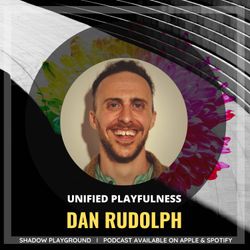
17. Unified Playfulness with Dan Rudolph
48:42||Season 1, Ep. 17-GUEST BIOGRAPHY- Dan Rudolph is an educator, facilitator, systems thinker, and seeker of truth. For 2.5 years, Dan lived in a monastic setting, professionally practicing mindfulness. During his spare time at the monastery, he studied clowning and offered play-based workshops in the community. In this period the connections between 'play', meditation and culture-change became increasingly clear.The positive feedback and impact that people shared from the workshops inspired Dan to keep going and nurture the seeds of what is now called Unified Playfulness, which is a unique play-based approach geared towards the cultivation of mindful awareness and behavior change. Dan offers customizable and general Unified Playfulness workshops for individuals, teams, and public groups, both online and in-person. He is currently based in Tio:tia’ke/Montreal, on the shores of the Iroquois River. You can contact him at danrudolph108@gmail.com.Website: https://stitch-bottle-42c.notion.site/Unified-Playfulness-8cc8859d87724fbdb3bed91b20310a19-EPISODE SUMMARY-PRACTICES: Chant with the different parts of the ohm sound (a-o-mm). Inspiration from Butoh clown: moving slowly and laughing. Role-play situations in life where you could integrate mindfulness. Speak in a different voice. Try doing not practical things. Start gatherings with a grounding practice like meditation, touch, massage, dancing or shaking. Try to communicate with other people without words. You can integrate mindfulness and play into your day in many different ways. Sing with your toothbrush. Laugh while doing dishes. Making a cover fort & tell a story. Take 10 minutes each day to play - no regular words or technology, everything else is ok Give yourself a little quest when you go outsideStarting a creative hobby like learning how to juggle. Make yourself as ugly as possible with makeup. Talk to the plants like they were alive - ‘Hey, how are you doing today?’Send a message to yourself a week later and send it by e-mail. Cook and do something different.Intuitive writing involves simply writing without thinking and permitting yourself to be open. IDEAS: Taking things not so seriously can improve our ability to handle serious and complex topics. We can shift unhealthy patterns that have developed by changing our behaviour. Balance is needed between the rational and the intuitive, the competitive and the cooperative. Play and mindfulness share many characteristics. They are both regenerative practices. Develop a state of mind where play and mindfulness are integrated into everything you do. Our shadow parts can be our deepest learnings. You can ensure people will be safe all of the time because people have different needs.